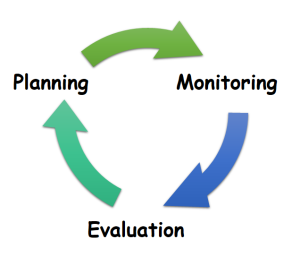7
Plan-Monitor-Evaluate Connection
This chapter introduces you to a learning cycle based on three steps: planning, monitoring, and evaluation. Understanding this cycle is connected to developing the skill of metacognition, which you will learn about in this chapter. At the beginning of each of the remaining chapters in this book, you will discover how the skills you will learn connect to the cycle.
Learning Objectives
By the end of this chapter, you will be able to:
- Identify ways that the information in this book will support your learning journey.
- Define the term metacognition.
- Describe the steps in the planning-monitoring-evaluation cycle.
- Apply the planning-monitoring-evaluation cycle to your learning process by asking key questions at each stage.
A good foundation for university is learning how to learn. By taking the time to read this book and work through the exercises included, you are investing in the skills that will support you in all of your classes and future learning. Successful students share a set of skills and habits in common. The good news is that these skills are not a secret; anyone can learn the skills that support successful learning. By taking some time to learn proven study strategies, you will be able to reach your learning goals, and avoid the pitfalls that can take you off-track.
This book is meant to support you in your journey. In this chapter, you will focus on a skill called metacognition, which you will apply to the learning cycle. These concepts will support your understanding of the study strategies presented in each of the chapters that follow.
What is metacognition? The plan-monitor-evaluate cycle
Have you ever wondered what the most successful students do differently from other students? Students who have developed effective ways of learning have mastered a skill called metacognition. In simple terms, metacognition is understanding your own thinking and learning processes. In other words, it is “thinking about your thinking”. Metacognitive skills include planning your learning, monitoring whether your current learning strategies are successful, and evaluating results of your learning. Improving your metacognitive skills is associated with increased success in all of your academic life.
How do you gain the skill of metacognition? One way to think about developing metacognition is gaining the ability to plan, monitor, and evaluate your learning.

Planning involves two key tasks: deciding what you need to learn, and then deciding how you are going to learn that material.
Monitoring requires you to ask “how am I doing at learning this?”. In monitoring, you are constantly tracking what you have learned, what you don’t yet know, and whether your study strategies are helping you to learn effectively.
Evaluation involves reflection on how well you met your Learning Objectives after completing a unit of study, or receiving feedback (such as a test or assignment).
Key Questions to Improve Your Learning
At each stage in the learning cycle, there are key questions that you will ask yourself to support your learning process. In the chart below, you will identify the key question for each stage in the cycle, along with the other questions you will want to consider.
| Key question | Other questions to ask yourself |
| What do I need to learn? (Planning) |
|
| How am I going to learn the material? (Planning) |
|
| How am I doing at learning this material? (Monitoring) |
|
| Did I learn the material effectively? (Evaluation) |
|
Try it!
Two key questions in the Planning phase of learning are: (1) What do I already know about this topic? and (2) What do I want to learn? In this exercise, you will apply these two questions to your knowledge about learning strategies.
Download a printable worksheet for this exercise.
| What do I already know about learning strategies for university studies? | What do I want to know about learning strategies? |
|
|
Licenses and Attributions:
Content previously published in University 101: Study, Strategize and Succeed by Kwantlen Polytechnic University, licensed as CC BY-SA.
Adaptations: Rearranged order
- Chick, N. (2017). Metacognition. Retrieved August 31, 2017, from https://wp0.vanderbilt.edu/cft/guides-sub-pages/metacognition/↵/ ↵
- Tanner, K. D. (2012). Promoting student metacognition. Cell Biology Education, 11(2), 113–120. https://doi.org/10.1187/cbe.12-03-0033↵ ↵
